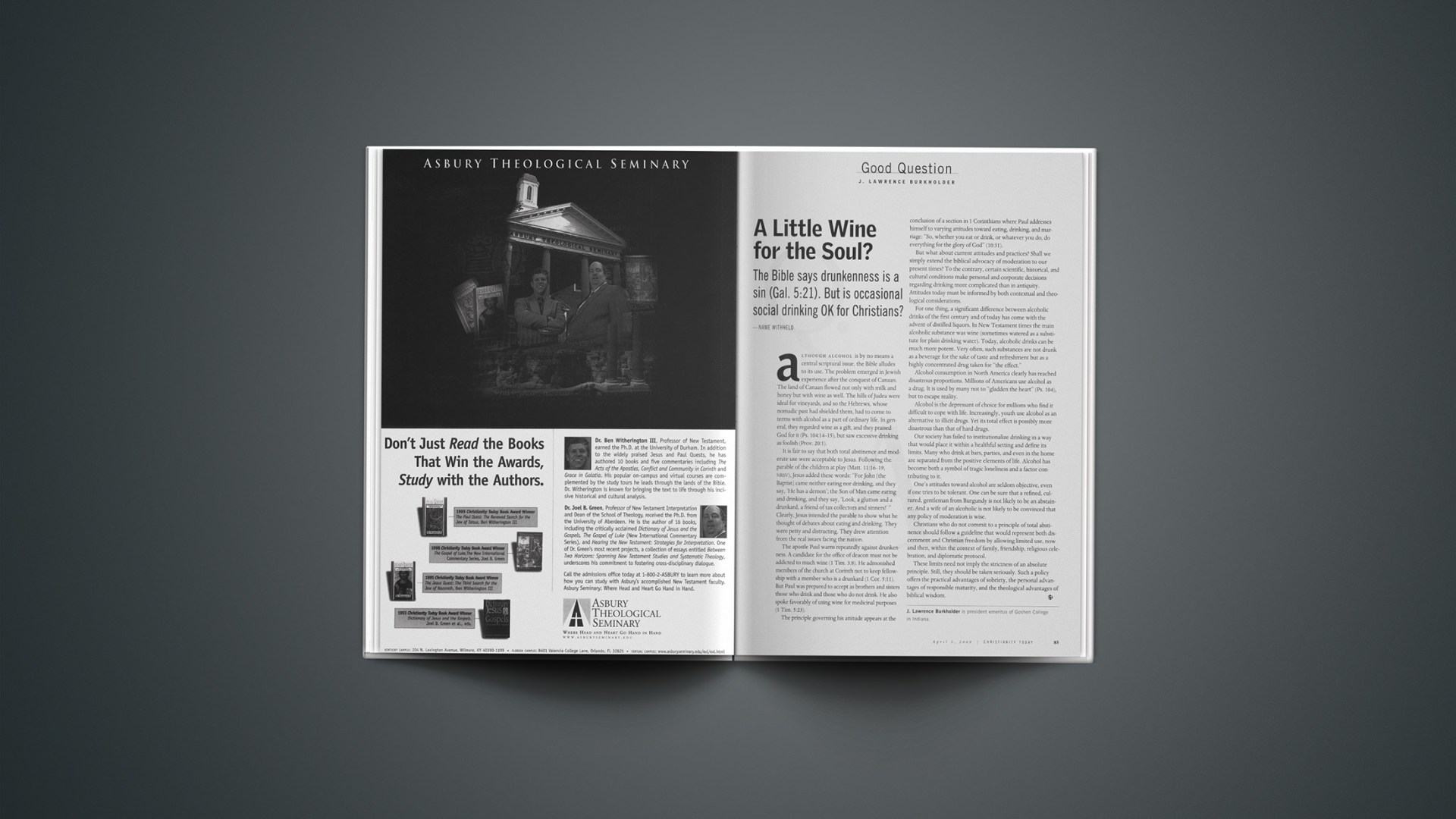Although alcohol is by no means a central scriptural issue, the Bible alludes to its use. The problem emerged in Jewish experience after the conquest of Canaan. The land of Canaan flowed not only with milk and honey but with wine as well. The hills of Judea were ideal for vineyards, and so the Hebrews, whose nomadic past had shielded them, had to come to terms with alcohol as a part of ordinary life. In general, they regarded wine as a gift, and they praised God for it (Psalm 104:14-15), but saw excessive drinking as foolish (Proverbs 20:1).
It is fair to say that both total abstinence and moderate use were acceptable to Jesus. Following the parable of the children at play (Matthew 11:16-19, NRSV), Jesus added these words: "For John [the Baptist] came neither eating nor drinking, and they say, 'He has a demon'; the Son of Man came eating and drinking, and they say, 'Look, a glutton and a drunkard, a friend of tax collectors and sinners!' " Clearly, Jesus intended the parable to show what he thought of debates about eating and drinking. They were petty and distracting. They drew attention from the real issues facing the nation.
The apostle Paul warns repeatedly against drunkenness. A candidate for the office of deacon must not be addicted to much wine (1 Timothy 3:8). He admonished members of the church at Corinth not to keep fellowship with a member who is a drunkard (1 Corinthians 5:11). But Paul was prepared to accept as brothers and sisters those who drink and those who do not drink. He also spoke favorably of using wine for medicinal purposes (1 Timothy 5:23).
The principle governing his attitude appears at the conclusion of a section in 1 Corinthians where Paul addresses himself to varying attitudes toward eating, drinking, and marriage: "So, whether you eat or drink, or whatever you do, do everything for the glory of God" (10:31).
But what about current attitudes and practices? Shall we simply extend the biblical advocacy of moderation to our present times? To the contrary, certain scientific, historical, and cultural conditions make personal and corporate decisions regarding drinking more complicated than in antiquity. Attitudes today must be informed by both contextual and theological considerations.
For one thing, a significant difference between alcoholic drinks of the first century and of today has come with the advent of distilled liquors. In New Testament times the main alcoholic substance was wine (sometimes watered as a substitute for plain drinking water). Today, alcoholic drinks can be much more potent. Very often, such substances are not drunk as a beverage for the sake of taste and refreshment but as a highly concentrated drug taken for "the effect."
Alcohol consumption in North America clearly has reached disastrous proportions. Millions of Americans use alcohol as a drug. It is used by many not to "gladden the heart" (Psalm 104), but to escape reality.
Alcohol is the depressant of choice for millions who find it difficult to cope with life. Increasingly, youth use alcohol as an alternative to illicit drugs. Yet its total effect is possibly more disastrous than that of hard drugs.
Our society has failed to institutionalize drinking in a way that would place it within a healthful setting and define its limits. Many who drink at bars, parties, and even in the home are separated from the positive elements of life. Alcohol has become both a symbol of tragic loneliness and a factor contributing to it.
One's attitudes toward alcohol are seldom objective, even if one tries to be tolerant. One can be sure that a refined, cultured, gentleman from Burgundy is not likely to be an abstainer. And a wife of an alcoholic is not likely to be convinced that any policy of moderation is wise.
Christians who do not commit to a principle of total abstinence should follow a guideline that would represent both discernment and Christian freedom by allowing limited use, now and then, within the context of family, friendship, religious celebration, and diplomatic protocol.
These limits need not imply the strictness of an absolute principle. Still, they should be taken seriously. Such a policy offers the practical advantages of sobriety, the personal advantages of responsible maturity, and the theological advantages of biblical wisdom.
J. Lawrence Burkholder is president emeritus of Goshen College in Indiana.
Related Elsewhere
Be sure to check out our supplemental articles on Christians and alcohol:
Amassed Media: The Drink Debate | What Christian leaders past and present have said about social drinking—and where to find them online.
CT Classic: America's Battle Against the Bottle | Evangelical support of temperance is no cause for embarrassment in our intemperate society.
CT Classic: Total Abstinence and Biblical Principles | One of Christianity Today's earliest cover stories examined alcohol on the 25th anniversary of Prohibition's repeal.
Earlier "Good Question" columns include:
- Should We All Speak in Tongues?
- Did Jesus Really Descend to Hell?
- Take, Eat-But How Often?
- Is Christmas Pagan?
- Are Christians Required to Tithe?
- Is Revelation Prophecy or History?
- You're Divorced-Can You Remarry?
- If Grace Is Irresistible, Why Evangelize?
- If I'm an Evangelical, What Am I?
- A Cracked Code
- Committing the Unforgivable Sin
- What Bible Version Did Jesus Read?
- Did God Die on the Cross?
- You Must Be Born Again-but at What Age?
- Was the Revolutionary War Justified?
- Can the Dead Be Converted?
- Cloaked in Mystery
- Is Hell Forever?
- Denominations: Divided We Stand
- Did Paul Baptize for the Dead?
- Do Demons Have Zip Codes?
- Doubting Thomas's Gospel
Copyright © 2000 Christianity Today. Click for reprint information.










